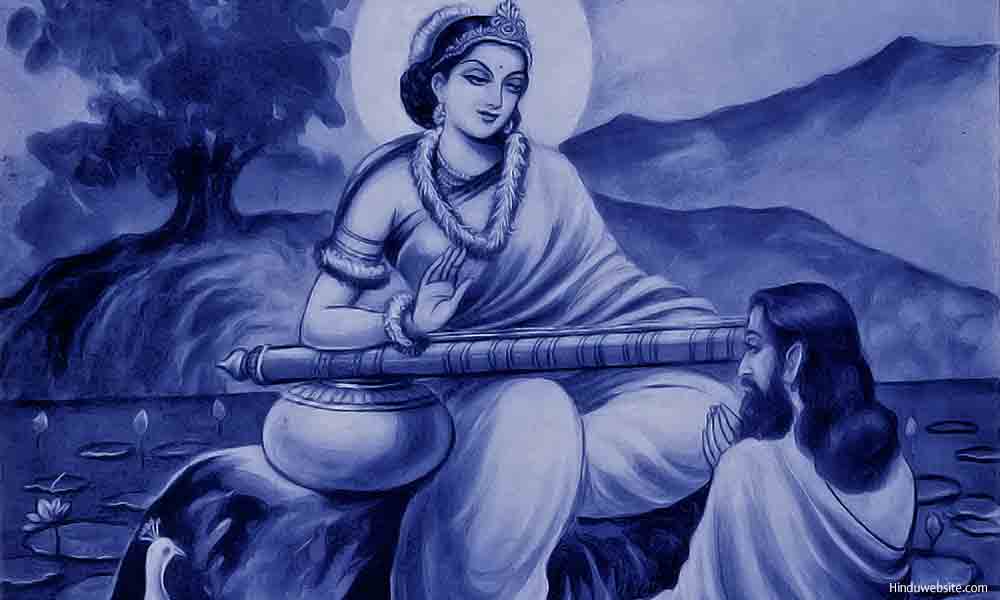
Saraswathi Dvadasa Nama Sthothram

Sarasvathee namasthubhyam veena pusthaka dharinee
Guidelines for pronunciation are in the footnotes
saraswathee dvaadasha nama sthothram
sarasvatheemayam drushtvaa veenaa pusthaka dhaarineem
hamsavaahana samaayukthaa vidyaa daanakaree mama
pradhamam bhaaratheenaama dvitheeyam cha sarasvathee
thritheeyam
shaaradaa devi chathurtham hamsavaahinee
panchamam jagathee khyaathaa shashtam vaageesvaree thadhaa
kaumaaree sapthamam prokthaa ashtamam brahmachaarinee
navamam buddhi dhaathree cha dashamam varadaayanee
ekaadashe
kshudraghantaa dvaadasham bhuvanesvaree
braahmeei dvaadasha naamaani thrisandhyam yah pattennara
sarva siddhikaree thasya prasannaa parameshvaree
saame vasathu jihvaagre brahma ruupaa saraswathee
ithi
shree saraswathee dvaadasha naamaani sampuurnani
Suggestions for Further Reading
- Popular Prayers of Hindu Gods and Goddesses
- Aspects, Emanations, Incarnations and Forms of God Vishnu
- Hindu God Vishnu, the Preserver
- Dainya Ashtakam
- Sri Gopala Ashtakam
- Sri Gopala Sthavam
- Govardhana Ashtakam
- Sri Govardhana Dharashtakam
- Sri Krishna Ashtakam
- Sri Krishna Ashtakam by Vallabhacharya
- Sri Krishnashraya Sthothram
- Sri Krishna Dvadasanama Sthothram
- Sri Krishna Sharana Aasthakam
- Sri Krishnashtaka Sthothram
- Sri Krishna Sthothram
- Sri Krishna Thandava Sthothram
- Sri Madhurashtakam
- A Prayer During a Pradakshina at a A Hindu Temple
- Salutations to Dikpalas, Rishis and Devathas
- Ganapathya Atharvashirsham
- Shri Ganesha Ashtotthara Sathanama Puja
- Essays On Dharma
- Esoteric Mystic Hinduism
- Introduction to Hinduism
- Hindu Way of Life
- Essays On Karma
- Hindu Rites and Rituals
- The Origin of The Sanskrit Language
- Symbolism in Hinduism
- Essays on The Upanishads
- Concepts of Hinduism
- Essays on Atman
- Hindu Festivals
- Spiritual Practice
- Right Living
- Yoga of Sorrow
- Happiness
- Mental Health
- Concepts of Buddhism
- General Essays
Guidelines to pronunciation: Sanskrit is essentially a language of sounds and sound vibrations. The efficacy of Sanskrit prayers depends upon the vibrations that are produced during chanting. It is difficult to transliterate Sanskrit words into English with full justification to the original sounds. In the above stated transliteration we followed a simple approach to make it easier even for those who are not familiar with English or Sanskrit. Wherever you find repeat vowels (aa, uu, ee) please stretch the vowel sound (for ex., aa as in vast or path, uu as in cool or root, ee as in eel or feel). Similarly, "ai" should be pronounced as in gait, fight, or tight. Th should be pronounced as in think or thick, but when t alone is used, it should be pronounced as in two, top or tip.